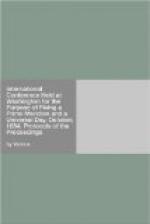The PRESIDENT. May I ask the Delegate from Germany whether his remark applies to the amendment?
Baron H. VON ALVENSLEBEN, Delegate of Germany. Yes, sir; to the amendment, and to the resolution, also.
Prof. ADAMS, Delegate of England. Mr. President, I must say that I am very much inclined to agree with the Delegate of Germany in the opinion that this is only a question of detail.
It is a mere matter of convenience whether we count longitudes in one direction only, or in two opposite directions, considering longitudes measured in one direction as positive and in the opposite direction as negative. These two methods are nominally different from each other, but in reality there is no contradiction between them.
In the mathematical reckoning of angles we may agree to begin at zero, and reckon in one direction round the entire circumference of 360 degrees, but this does not prevent a mathematician, if he finds it convenient for any purpose, from reckoning angles as positive when measured in one direction, and negative when measured in the opposite direction.
If angles be considered positive when reckoned towards the east, it is quite consistent with this usage that they should be considered negative when reckoned towards the west.
It is much more convenient to consider all angles as positive in astronomical tables, but for other purposes it may be more convenient to employ negative angles also, especially when, by so doing, you avoid the use of large numbers.
In comparatively small countries, like Great Britain for instance, it is more convenient when giving the longitude of a place in the west of England to consider it as being a few degrees west of Greenwich, rather than 350 and some degrees to the east of that meridian.
Commander SAMPSON, Delegate of the United States. Mr. President, while I think the question of reckoning longitude is a matter of detail, I think it devolves upon us to decide it one way or the other. Navigators are more interested in the question than mathematicians, and the longitudes must be engraved upon our hydrographic charts.
Now, as the learned Delegate of Great Britain, Prof. ADAMS, who has just spoken, has stated, the principle involved is the same, whether we reckon east or west, or reckon continuously in the same direction. It seems to me, however, that when we come to consider the reckoning of longitude in connection with the adoption of a universal day, we should then make a decided choice in favor of counting longitude from zero to 360 degrees. If we adopt the resolution which my friend, the Delegate of the United States, Mr. RUTHERFURD, has offered, it will be in perfect conformity with the habits of the world. For that reason, and it is a very strong reason, I think it might be adopted; but a little consideration will show that if we reckon the longitude from zero to 360 degrees, east to west, then we will change the




